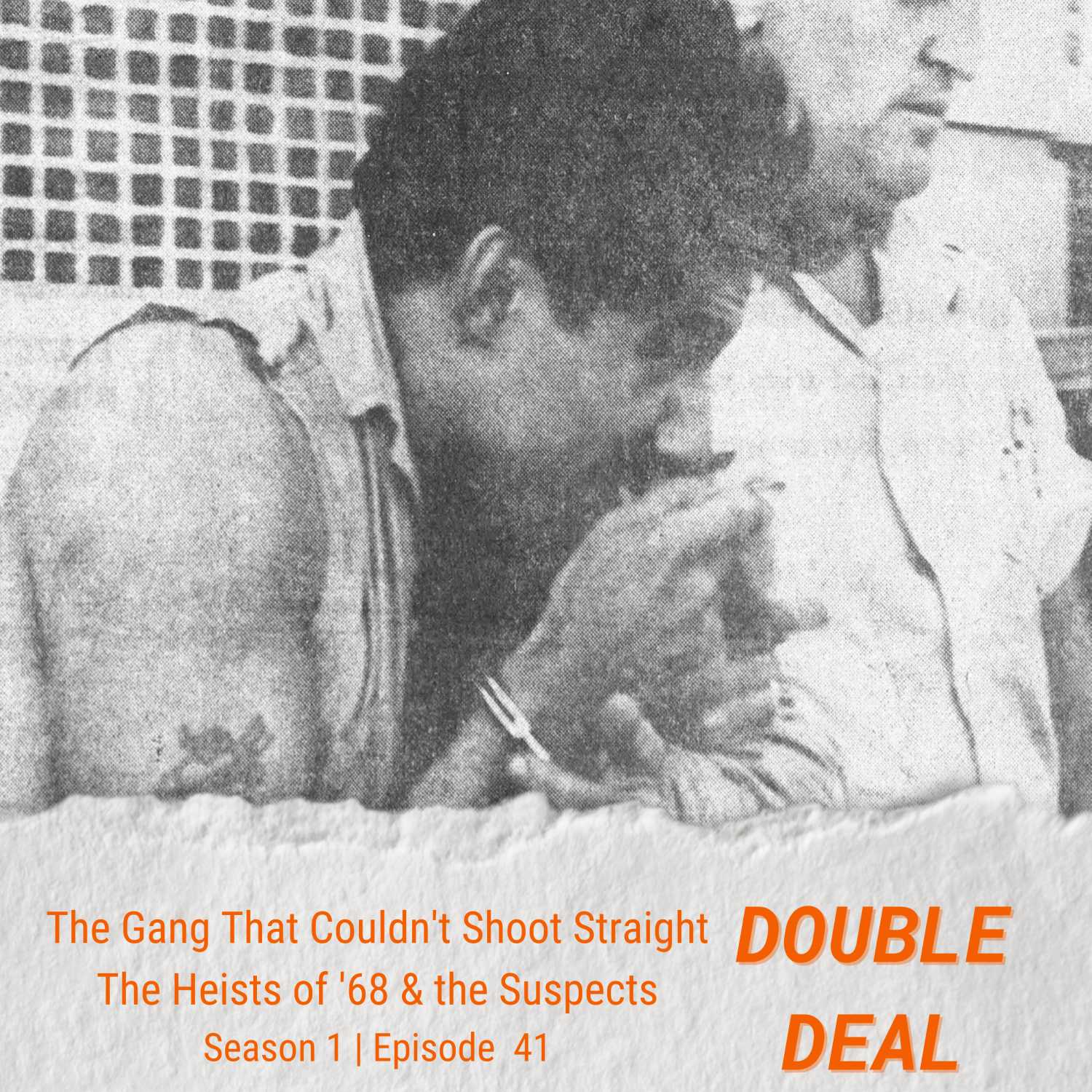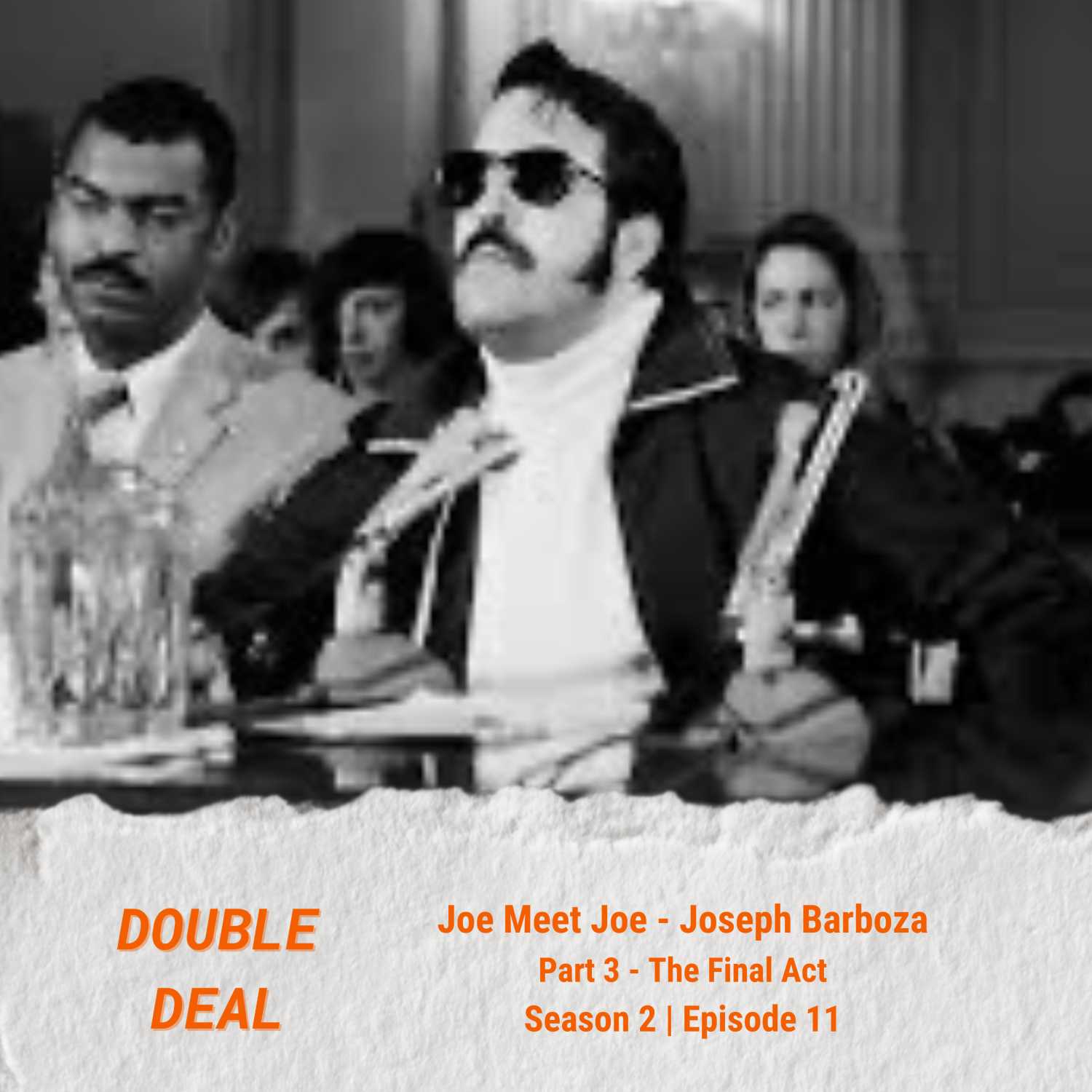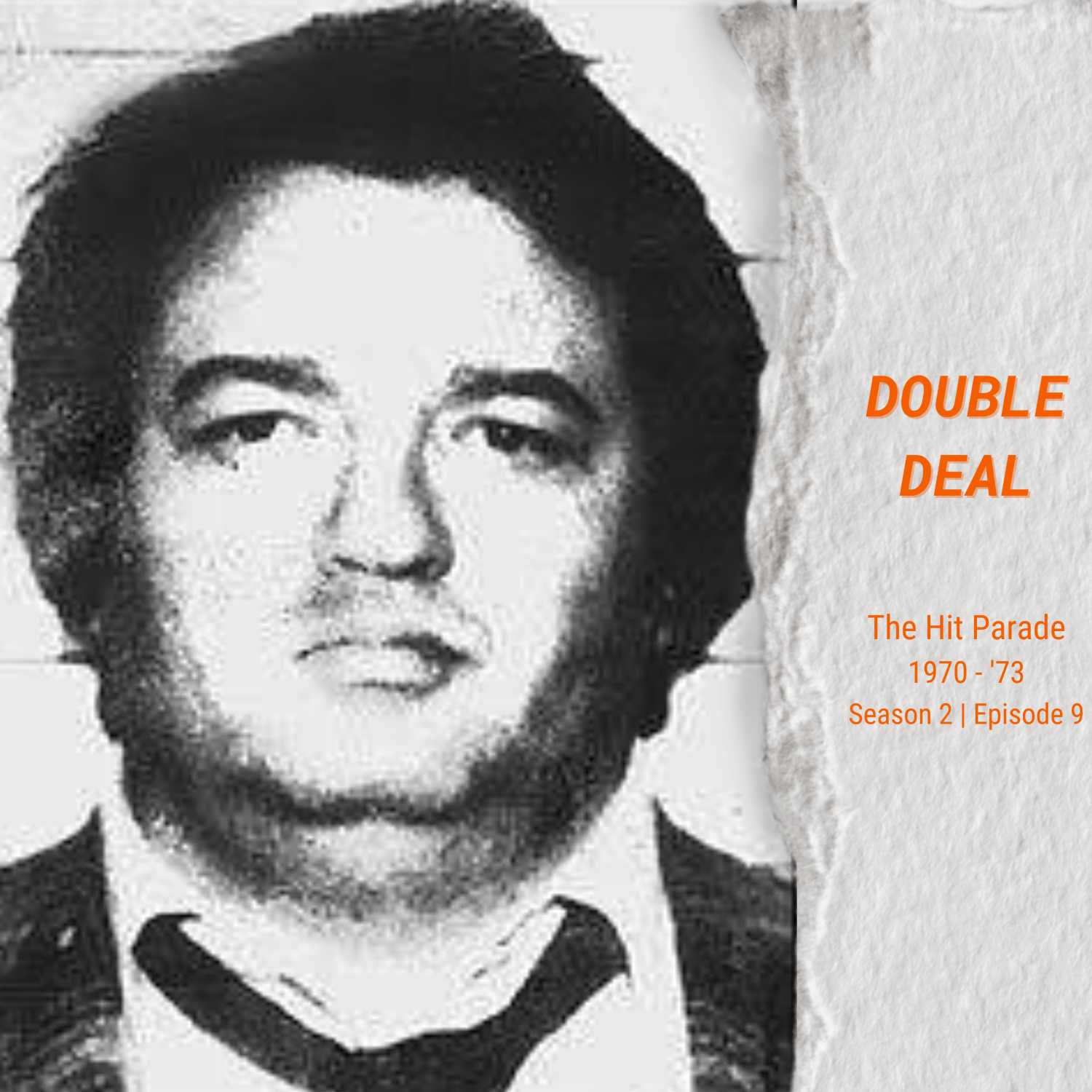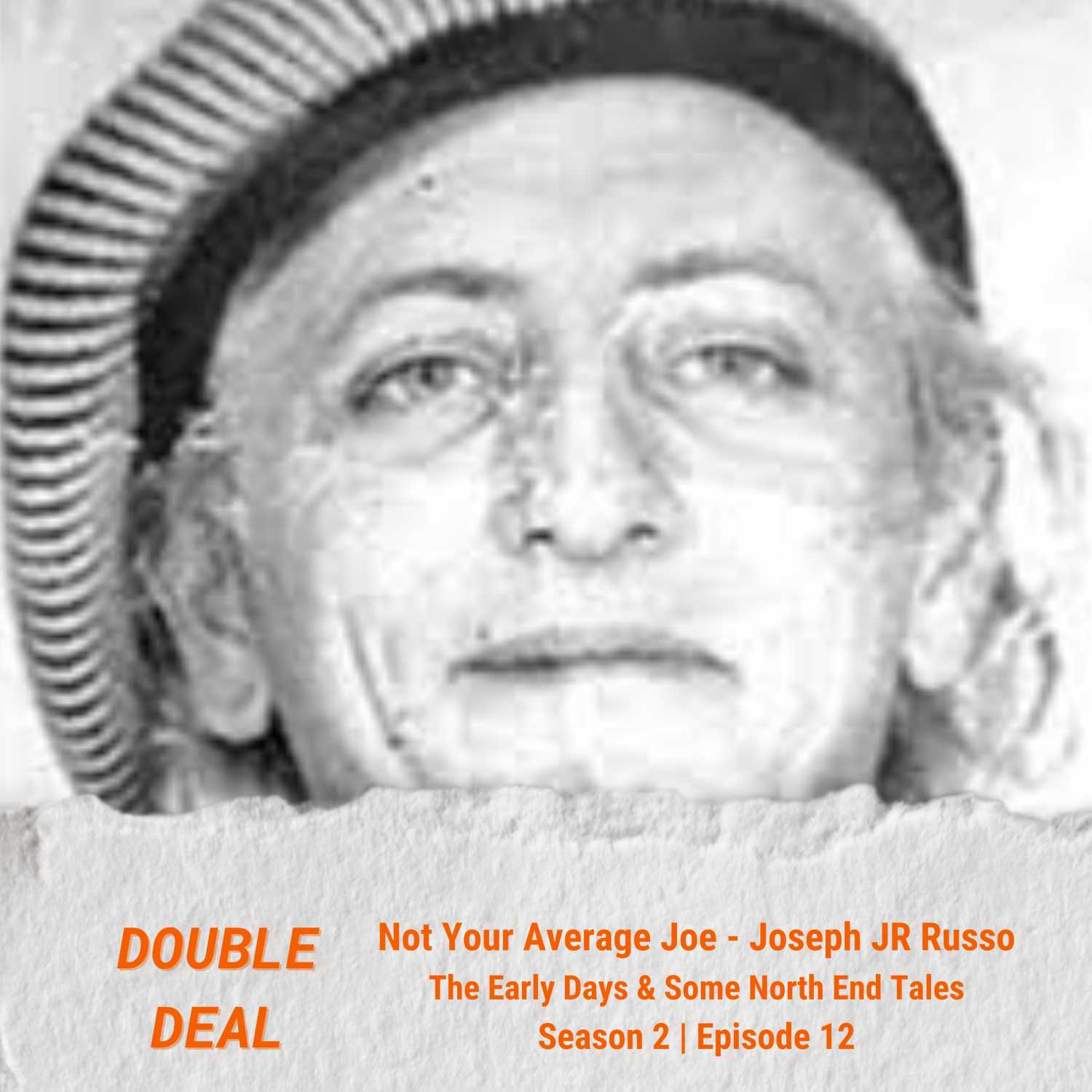"They're After Me Like a F*ing Animal" - Jerry Angiulo - The Early Days
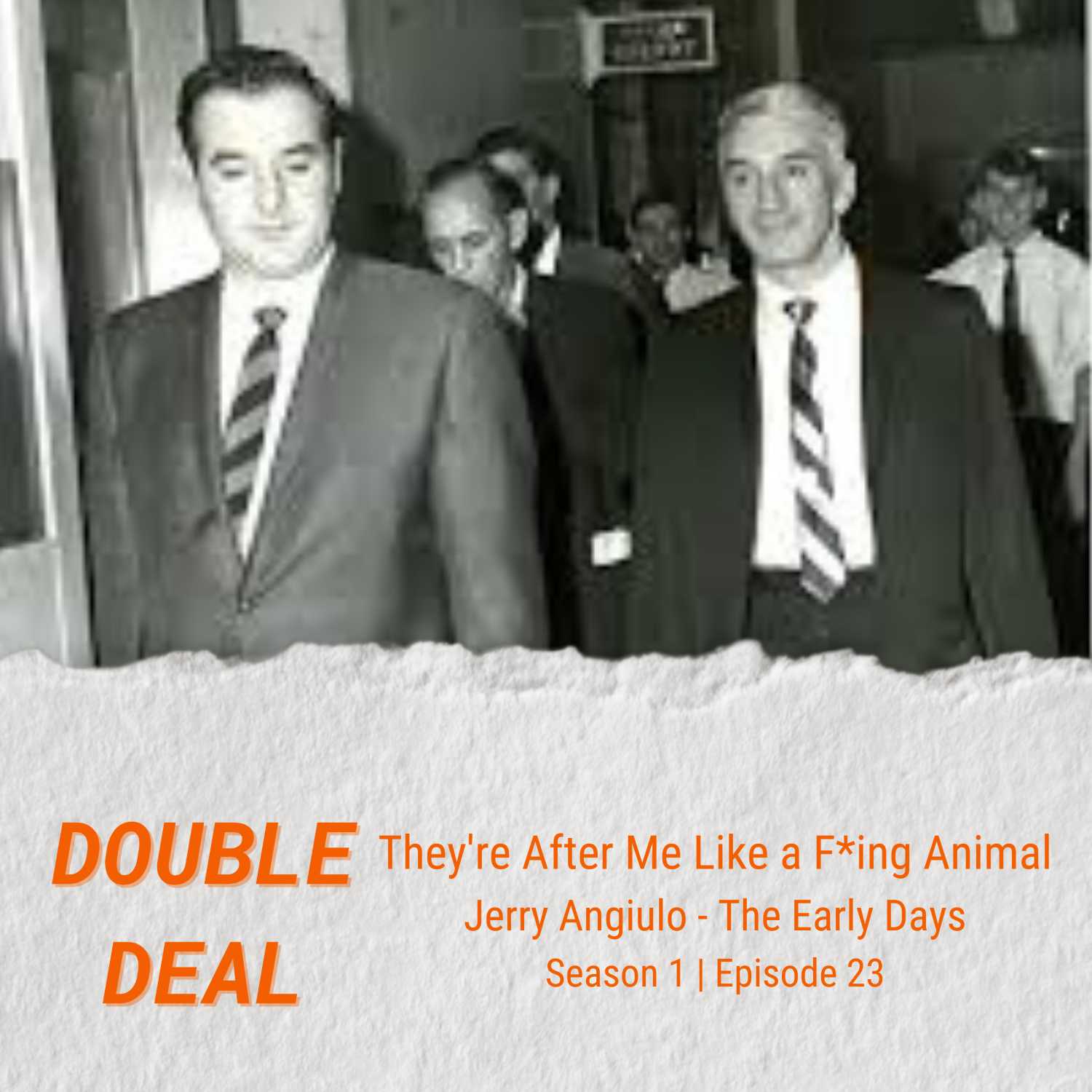
Boston crime czar Jerry Angiulo kept a tight inner circle and only worked with his brothers when he started out. Initially confining their activities to bookmaking, the Angiulo enterprise expanded into money lending, restaurants, a country club, radio jingles, and greeting cards, among other things. But as Jerry and his brothers' business grew, so did their circle, which included several FBI informants and a wiretap at their headquarters.
Follow us on Twitter for sneak peeks of upcoming episodes. You can also find us on Instagram and Facebook.
Questions or comments, email lara@doubledealpodcast.com or nina@doubledealpodcast.com
Thank you for listening!
All the best,
Lara & Nina
Lara:
Welcome back everyone! Today Nina and I are going to be discussing Gennaro “Jerry” Angiulo.The title of this episode is a quote from Jerry caught on the wiretap at Raymond Patriarca’s office. “They’re after me like a fucking animal!” The “they” he was referring to was the IRS, who at the time, was trying to build a case against him. I’ll say up front that I have a bit of a soft spot for Jerry. Back in the early 70s my dad and I came home to find a man in the front yard taking pictures of our home. Of course dad was less than cordial having no idea who this stranger was. The man with the camera proceeded to tell him that our home was being auctioned off the next day. Dad couldn’t understand what he was telling him. The house was in my uncle Brendan’s name at that time. Like the majority of criminals, I’d assume, nothing was in dad’s name. Brendan was a degenerate gambler and took a mortgage on the house and never said a word or paid a dime. Dad needed 25 grand by the end of the day or bye-bye house. Dad went straight to Danny Angiulo, one of Jerry’s brothers who then took him to Jerry. By the end of the day the mortgage was paid off. At the beginning of season 2 we’ll get to why Jerry extended that favor to dad.
Nina:
Even I have to say Jerry wasn’t all bad. He did one other good deed later in the 1970s but you’ll have to wait for season two for that story. Really my gripe with Jerry was the gossip and the complaining.
Lara:
I blame Raymond for setting the tone.
Nina:
Well he was “The Boss”!
In this episode we will only be covering up to 1969. For any of our listeners who might be new, season 1 is mainly focused on the 1960s, but we sometimes go back to the early 20th century to give background about the people and events we’re discussing. There’s been a lot written about Jerry over the years, so we’re going to try to cover some of the lesser known things. With that being said, let’s start with Jerry’s genealogy.
Gennaro Joseph Anguilo was born on March 20, 1919 in Boston to Cesare and Giovanina “Jennie” Anguilo. His father was from Bari and his mother was from Avellino. They met and married in Boston in 1915. Jerry was the third of seven kids, all boys except one girl.
Lara:
Jerry enlisted in the Navy at the beginning of WWII in 1941 and served for 4 years mainly in the Pacific. His brother, Frank, was in the Merchant Marines during WWII. Another brother, Mike, enlisted in the Army in 1951.
Unlike most of the people we’ve profiled so far Jerry did not have an extensive record before his rise to power. In fact, it’s said that prior to the war he wanted to become a criminal lawyer. I believe that the fact that he only worked with his brothers and kept a tight inner circle in his early days helped keep him on the streets.
Nina:
I agree that he was wise to keep it in the family. In particular his older brother Nicolo “Nicky”, and three of his younger brothers, Francesco “Frank”, Donnato “Danny” and Michele “Mike” Angiulo.
Lara:
The first arrest I could find was in July of 1941 for registering bets. He was fined $100. In June of 1947 he was fined $100 again, this time for illegal dog race betting.
He and several associates rented a house near the Dighton Dog Track. A second floor window of the house gave them a view of the scoreboard. By keeping field glasses trained on the scoreboard, the men were able to get the results of the races sooner. According to the authorities, the men were making bets on the races after the races were finished but before the results had reached their competitors who weren’t on site. An additional charge of conspiracy was lodged.
That same year Jerry married Anne Susanne Rakauskas, the daughter of Lithuainian immigrants, and a department store model.
Nina:
Every article you read about Jerry that mentions his first wife, said her surname was Anderson.
Lara:
It was the name she used when she was modeling before she married Jerry. Dragging Rakauskas around when she was going on a go-see must have been a nightmare, so she picked Anderson. I can’t say anything. In my younger days, I contemplated using an easier surname.
Anyhow, in September of 1947, Jerry, his brother Frank, and Michael Arena were arrested on lottery and gambling charges. It was said that they were taking $20,000 worth of action a day via phone lines that were plugged into the neighbors’ lines. The three of them were caught fleeing down a fire escape.
Nina:
In 1950 Jerry and at least two of his brothers were brought in for questioning by the FBI about the Brink’s case.
Lara:
Who wasn’t brought in for questioning?
Nina:
You’d probably have an easier time listing out who wasn’t questioned. Remember that SA Kehoe later claimed in court that they’d interviewed something like 6000 people over the course of the case.
By 1950, the Angiulos were reportedly the biggest bookies in the North End. They used a variety store at 95 Prince Street as their front. It was across the street from the restaurant-deli that their parents ran. The restaurant was apparently a legitimate enterprise, unlike the store which never had anything on the shelves to sell.
They banked their own bets, and would not accept large bets, particularly if that bet was a longshot. Their activities were reportedly only confined to bookmaking and they had no interest in other criminal activities.
Lara:
By 1951, they had expanded again, buying up 45% of the lottery ticket called “The Local”, and changed the name to “The Pilgrim”. In 1954, they tried to buy out an unnamed bookie for $75,000. But somebody higher up, probably Johnny Williams, told them to back off.
Nina:
On May 11, 1956, Jerry’s brother, Danny Angiulo was brought in to the Quincy Police Department for questioning. The police had received an anonymous tip that Danny was linked to Billie Aggie’s bank robbery fiasco that had taken place earlier in the day. Jerry came to bail his brother out, and the Feds took the opportunity to question Jerry about Billie and his associates as well.
Lara:
A two for one deal!
Jerry acknowledged that he was acquainted with Sonny Diaferio, who was a frequent visitor at the Monte Christo on Carver Street which was owned by the Angiulo brothers.
He also stated that Sonny interceded for his brother in obtaining a bartender's job for him at the Riverway Cafe on South Huntington Ave, which was also owned and operated by the Angiulos.
Nina:
Obviously nothing ever came of that fishing expedition. You all know that Billie went away and the cops had to release Sonny for the time being.
By 1958, the Angiulos were described as the biggest money lenders in the City of Boston.
In May 1960, an informant told the FBI that the Angiulo brothers were the only ones looking to expand their operations. They had been contacting every agent possible to get them to enter their employ. The other bookies in the area were keeping a low profile due to the recent crackdown by the authorities against illegal gambling.
Just a few months later, Danny and Frank Angiulo were arrested in a bookmaking raid. The newspaper headline read “1,000 jeer police raid on Boston bookies”. Both Frank and Danny assaulted the arresting officers with phone books and the cops were attacked by a dog. By the time the police hit the street the crowd was screaming, “go to South Boston. Get out of the North End, coppers. Go home. Get out. Let’s touch the untouchables.”
Lara:
The police issued a statement after the raid:
“It was the most blatant disrespect for law and order that I have ever witnessed.”
But that’s how it was in those days. The West End and North End were especially tight. I told the story back in episode 8 about my grandma being the lookout during the dice games that my uncle Danny and some of the other boys would run in the doorways and alleyways.
Nina:
On March 4, 1961, the Nahant home of Jerry’s burnt to the ground. The Carey Mansion as it was known was valued at $30,000 plus an additional $5000 in contents. His wife and kids were in Florida at the time and Jerry was awol.
In July of 1961 Jerry was described in an FBI 302 as “a gambler and wealthy Boston shylock”. He was said to be the owner of the American Finance Corporation located on Hanover St. It had been incorporated on January 17, 1934, so it was likely created by Joe Lombardo and his crew. American Finance was wholly owned by the Northeast Investment Company. Northeast was owned by the Community Finance Company which had been incorporated in September of 1957. In 1960 Jerry purchased $20,000 worth of stock in American Finance from Joe Modica. Later that year he sold his stock for $50,000. Nice profit.
Lara:
One of the officers of Jerry’s businesses was Al Horrigan. To the best of our knowledge he was informant number BS-769 and was reporting as early as 1959. He would continue as such into the early ‘70s. Dennis Condon was his handler. Horrigan claimed to be an attorney although other than one document from some obscure publication, there is no evidence of that. However, decades later, his name would appear in the Senate hearings with atty. in front of it. Al will be making an appearance at the beginning of season 2. No shortage of twists, turns and intrigue there.
Nina:
Another officer and business associate was Arthur Hammel. He also ran Commercial Producers, Inc for Jerry. They made jingles and greeting cards. Jerry went into great detail describing to Raymond how he made money from that, right down to the salesman’s commission.
Lara:
Spreading cheer across the land with jingles and greeting cards!
Let’s jump forward to 1962.
An airtel was issued from the Boston FBI field office to DC on July 25, 1962:
"A new informant has been developed. This informant appears to have good insight and close contacts with the Angiulo operations."
Nina:
I cannot figure out who this was and it drives me nuts.
Lara:
In August, the Boston Field Office sent a memorandum to DC reporting that IRS Agent Edgerly received a payoff of an unknown amount to bring the tax investigation against the Angiulo brothers to an end. The following week Hoover corresponded with the SAC in Boston informing him that another agent received $3000 to make the case disappear. This information was obtained from a recorded conversation between Jerry and Raymond on August 3rd.
Nina:
The crazy thing is that in 1975 when the Senate Committee was investigating the bribes, the IRS informed them that they had no record of a case against Nicky Angiulo.
Lara:
It was in the newspapers! Talk about CYA.
Four months later, Hoover authorized microphone surveillance of Jerry's office at Jay's Lounge in Boston.
In a memorandum, dated November 27, 1962 Hoover requested of the Boston SAC: “Advise your progress in connection with the installation at Jay's Lounge, 255 Tremont Street, Boston.”
Nina:
On January 9, 1963 the FBI officially commenced the wiretap surveillance on Jerry. The FBI assigned the number BS 856-C* as the reference code for the gipsy wire. SA Dennis Condon received a $150 cash award for his contributions to the establishment of a “highly confidential source of information” of interest to the Bureau in the criminal field regarding Jerry Angiulo on February 21st. The following month the wire picked up Jerry speculating that Ronald Cassesso might be an Informant. Ronnie will be covered in our episode about Teddy Deegan.
Lara:
All that speculation must have stressed Jerry out as he, Peter Limone and two others headed to Miami in early March. On their first day there Jerry and Peter ran into a lamister who owed him $2500. Jerry asked for the money and the guy gave him a wise answer. So what did Jerry do? He had Peter take the guy just outside of the lobby and “knock him dead.” The lamister evidently was connected to the owners of the Fountainbleu where they were staying. The following day an unnamed man arrived at Jerry’s room at 1 in morning and began flushing the toilet and running the faucet before telling Jerry that Jerry had heat on him and the locals were looking to pick him up. He suggested that Jerry switch hotels.
Jerry’s response was classic, “I’ve been at the Founatinbleu long before they ever thought of Florida.” And with that he continued his working vacation.
Nina:
In October of 1963 Jerry was named during a Senate hearing. They referenced his FBI and BPD file stating he was accused of gambling, shylocking, burglary, theft and larceny. Following that hearing, BPD Commissioner, Edmund McNamara named Angiulo as the Underboss of New England. Jerry was described as the man on the scene in Boston, and a quiet operator who shunned publicity. The following day, the Boston Globe ran a piece after checking to see if Jerry had a record in the city of Medford where he was residing. The police told them he had no record, but he wasn’t living at home as his wife had taken a restraining order out on him. The neighbors said they had seen him coming and going in a limousine with a two car escort. They all claimed to have never met him, but described his wife as a good looking blonde with two well-dressed kids.
Lara:
But Jerry wasn’t suffering. He was developing three properties in Nahant, one of which would become his new home. Later that October, Nicky Anguilo was charged with assaulting an 18 year old from Chelsea and held on $100,000 bail. The boy was dating Nicky’s 13 year old daughter and he warned him to stay away from her. The boy didn’t listen and caught two beatings from Nicky. One resulting in 13 stitches to close a head wound. The case went to trial, and Nicky’s attorney was F. Lee Bailey. Nicky was found guilty, and Judge Felix Forte sentenced him to one year in Deer Island.
Nina:
In November five shots from another car shattered the windows and flattened the left front tire of Jerry’s limo while it was parked on Huntington Ave near the Angiulos’ Riverway Cafe at about 5 in the morning. The newspaper headline read “Angiulo’s Limousine Riddled with Bullets.” A green sedan with several men in it was seen speeding away towards Brookline just after the shooting.
Lara:
Between Jack's heists, Pro and Georgie McLaughlin, how many green sedans were spotted fleeing the scene of a crime? My theory is that it was Sonny Diaferio, Mello Merlino and Pro Lerner. Mello’s Texaco and Tire was right up the street. The three were hanging together and Pro lived in Brookline and had a green car.
Nina:
Hey it must have been a superstition thing. You know the luck of the Irish or something! Although Pro wasn’t Irish, so who knows. But that green sedan will be making several more appearances throughout the season.
The Feds were all over the shooting. A 302 from Boston dated just days later reported that Jerry could be heard on his wiretap saying that he had no idea who had shot up his car. He was not present when the shooting took place. He’d left the car about 90 minutes before the shooting. The Feds speculated: “It is possible the shooting was done by some person who mistakenly believed Angiulo was still in the car or done as a warning.”
To add credence to their theory, they noted that the day before the shooting, Salvatore Iacone had complained to Patriarca that Angiulo on the previous night had visited Iacone in the company of others and verbally abused him, calling him an obscene name on four different occasions during an argument over the proprietorship of the Indian Meadow Country Club, a joint enterprise of Iacone and Angiulo.
Iacone told Raymond that he had been about to kill Angiulo for insulting him but that had restrained himself because of the possibility that such an act would indicate disrespect for Raymond. In reply Raymond told Iacone that he should have killed Angiulo at the time the name was called and if Angiulo ever called Iacone the obscene name again Iacone had the right to kill Angiulo on the spot, no questions asked.
Lara:
Everytime I read a 302 and come across Raymond’s etiquette rules my head spins. My Plantagenet blood boils. The perceived slights and petty offenses are ludicrous.
Nina:
Tell me about it! It’s crazy. Who didn’t send a drink, who didn’t come to the table, who was in the restaurant first and so on.
Lara:
As we know, Raymond loved to dispense with his wisdom and advice whenever the opportunity arose. And Jerry too. He told Raymond to be leary of people wearing hearing aids, as they could be listening devices for the authorities!
Nina:
Oh, to have been a fly on the wall during that sermon.
A few days after Jerry’s car was shot up, his wife dropped her support demand in court.
In December the same year, the SAC in Boston sent a memorandum to Hoover. It was reported that Jerry was at Raymond’s complaining that DA Garrett Byrne upset the deal he had made in connection with the sentencing of his brother. Jerry went on to explain that although he didn’t have a direct deal with Judge Forte, the judge had agreed to show leniency if Nicky gave up his accomplices in the assault case. Jerry claimed that the DA pressured Forte to withdraw the offer.
It wasn’t long before Jerry started making the journey to Raymond’s in a pickup truck! He thought no one would know it was him.
Lara:
Like someone wouldn’t recognize him when he got out of the car, and talk about being conspicuous! A dapper, silver haired guy slipping out of a pickup truck. Sure! But you know, this brings up another one of the 302 mysteries. In addition to the wiretap, there were agents observing, photographing and running license plates on everyone in and out of the Coin-O-Matic. How could anyone be listed as “unnamed” in those transcripts?
Nina:
I’ve been asking myself the same question! I guess the Feds didn’t feel it was important.
Anyhow, later that month it was revealed to the public that the IRS was investigating Jerry and Nicky for income tax evasion. The Huntington Realty Trust and Parkway Enameling had been ordered to hand over their books in September. But neither Jerry nor the books had appeared by the deadline. The IRS asked the court to cite the Angiulos for contempt. But Nicky couldn’t appear as he was residing in Deer Island, so the contempt charge against him was withdrawn.
Lara:
In March of 1964, a judge ordered Jerry once again to hand over the records for his businesses. Jerry’s attorney tried to have the order overturned, but his plea was rejected.
A second appeal was made which dragged out until the end of the year. In December the court reissued the order and convened a grand jury. Six of the Angiulo brothers were subpoenaed to testify. When Jerry arrived, the press was there and waiting. He turned to the cameras and said,
”If you’re going to take a picture, take my good side.”
Nina:
He really did love flirting with the journos.
Lara:
No question about that! And I’m sure he loved the descriptions of his attire.
But the IRS agents weren’t such admirers. On May 24th, 1964 Jerry, Peter Limone and Billy Cresta assaulted IRS Agent Henry Foderaro in the Old Timers Club in the North End. In January 1965 he, Peter Limone and Billy Cresta were arrested for assaulting an IRS agent. They were later found guilty and ordered to pay $1000 each in fines and serve one month in federal prison.
After Jerry got out, Joe Modica, aka Don Pepino brought Jerry to an unnamed man to help with his tax case. Jerry told the man that the only way to fix his tax problem was to go straight to DC and skip the appellate court. He blamed the two agents working his tax case for all of his problems, since without them there wouldn’t have been a case. Jerry was highly skeptical that this unnamed individual would be of any help to him.
Nina:
But Jerry’s life wasn’t all court appearances and trips to Providence. In July that year he went to the Coliseum to investigate a guy who approached Nicky Giso asking Giso to make him. According to Jerry the unnamed man wasn’t just a moron but an imbecile. Jerry said the guy stood up in front of 130 people in the restaurant and did the twist! Jerry invited him down to the club and plied him with alcohol in an effort to get him to talk. After the fifth drink, his story was consistent.
Raymond was pissed off at Jerry for participating in such nonsense and told him that even if it was a joke, a member shouldn’t become involved in such stuff.
But Jerry also got Joe Lombardo involved. Lombardo was heated because he felt Giso was still under his jurisdiction, but Jerry disagreed.
Lara:
Well it didn’t stop there. Ronnie Cassesso was there while the solo Twist performance was going on, and he told Johnny Foto, who then told Joe Burns. Burns decided to tell Raymond. Foto also wanted to complain to Raymond but not about the Coliseum incident, but rather that Jerry wasn’t treating him well. Foto had Burns relay the message to Raymond. Foto was the former owner of the Peppermint Lounge in Miami Beach and was supposedly under Jerry’s supervision in Boston.
Nina:
Patriarca told Jerry that he was an intelligent individual but that there was one thing that he’d have to learn if he wanted to get ahead in the organization and that was not to act like Jimmy Cagney but be able “to give an individual hell in the same tone of voice as he did if he praised him”. He told Jerry that if he was able to accomplish this knack he’d go a long way in the organization.
But Raymond’s biggest concern was that the story would make its way to the guys in NY.
Lara:
Such nonstop drama. Like a damn Turkish soap opera.
In September of 1964 Jerry and Raymond attempted to make a donation to Francis Bellotti’s gubernatorial campaign. At the time Bellotti was the LT. Governor of Massachusetts. Bellotti flatly refused, so Jerry and Raymond went to Patrick “Sonny” McDonough who served on the governor’s council. McDonough allegedly funneled some of the money to Bellotti’s campaign through the names of various donors.
Nina:
In the meantime, Jerry was trying to refinance the Indian Meadow Country Club, so in February of ‘65 he concocted a scheme to sell 51 shares and 49 shares to two unnamed individuals who in turn would use the stock as collateral to obtain bank loans. During that same conversation between Jerry and Raymond, Jerry explained the circumstances surrounding the assault of the IRS agent. Raymond was more concerned about the squid shortage, and was engaged in lengthy conversations with the Colombo family about it.
Lara:
You know, I’d like to think that squid was code for something else, but I suspect it really was just about squid.
The two IRS agents who had taken bribes to drop the Angiulo tax case were arrested on January 8, 1965. They were both fired and brought to trial. In May, Jerry was back in court regarding his IRS case. Once again the court ordered him to turn over the books for Huntington Realty.
The following month, a blast occurred just 40 hours after Jerry, Frank. Mike and Danny through Huntington Realty took a loan from the Rosario Realty Trust whose trustee was Rosario Limone. The property was vacant, so no one was injured, but the doors were blown off making it impossible to tell if there was a break-in. The mystery of the blast was never solved.
Nina:
On June 16, 1966 the body of former boxer Rocco Diseglio was found in a wooded area in Topsfield, MA in his 1964 Ford Thunderbird. He had been shot 3 times in the back of the head with a .45 caliber handgun. One bullet went straight through his head and passed through the windshield. There were four suspects including Jerry. On August 6, 1967, he was charged with murder before the fact and conspiracy to commit murder, and arrested on August 9.
Lara:
Of course Jerry’s wardrobe was the highlight of the news articles describing him as looking like a successful businessman in a dark suit, white shirt and blue and black striped tie.
Nina:
Well, he was a successful businessman, amongst other things.
As for the case against Jerry, the main witness was none other than Joseph Barboza. Perjurer extraordinaire. Joe Balliro and Ronny Chisolm were Jerry’s and his co-defendants, Bernard Zinna, Mario Lepore and Richard DeVincent’s attorneys. It was Balliro’s mission to tear Barboza’s testimony apart. Balliro accused Barboza in court of “legally trying to kill these four men.” When Barboza took the stand, he stated that Angiulo ordered the hit on Di Seglio. He went on to say that the last time he saw Di Seglio alive was on June 15, 1965 and that he left with Zinna and DeVincent. The next day he said he met the two of them who said they killed Di Seglio on orders from Jerry. Under questioning by Ronny Chisolm, Barboza said he and Chico Amico went to see Jerry several days after the murder.
Lara:
Barboza claimed that Jerry told him that it was better that they took care of Di Seglio themselves rather than involving “the office” referring to Raymond. He continued to testify that DeVincent was running around acting like a big shot because he killed De Siglio. He said he knew DeVincent and Zinna from when they did time together in the Concord Reformatory in 1950. Under questioning Barboza said the first person he called after hearing that DI Seglio had been killed was Officer Fawcett, but that he made the call anonymously. Officer Fawcett confirmed Barboza’s statement.
Nina:
Well, wasn’t Barboza a good samaritan?
Lara:
No, he was a fucking lying lunatic!
Fawcett testified that he knew Barboza and his reputation and said that he and his fellow officers filled out special forms every time they saw Barboza and his associates. Barboza was frequently observed with NIcky Femia, Patrick Fabiano and Chico Amico who had been killed the year before. When asked if he had observed Di Seglio in East Boston the night he was killed, he said he did not. The trial continued through the middle of January of 1968. All four of the men were acquitted. Later in the month the prosecutor Pino resigned. He claimed to have made the decision before the start of the trial.
Nina:
Not only was Jerry free from jail, but his wife was free from him. In September she was finally granted a divorce on the grounds of cruel and abusive treatment. She was given custody of their 2 children and awarded $600 a month in support.
Lara:
In October of 1969, Jerry’s daughter, Thais Susanne, passed away while she was at nursing school. She was just 21 years old. There have been many rumors as to the cause of death including murder, but nothing ever developed.
Nina:
Just two weeks later, Jerry was arrested as an accessory after the fact in the VA robbery that had occurred in 1965. He was released, but ordered to not leave the state. Now you’re going to have to wait to find out the reason why and how he avoids conviction.
Lara:
And don’t cheat by looking in the newspaper archives because you won’t find the answer!
Nina:
Barboza’s attempt to frame Jerry for Di Seglio’s murder would just be one of many setups the Barboza would concoct in his effort to take revenge on the Mafia. We’ll get more into that in our next episode when we profile him.
Lara:
Really we didn’t want to cover him, but he is a part of the story of more than a few of the men in dad’s circle including Teddy Deegan, so we don’t have much of a choice. Thank you all for listening! Please share an episode with someone you know, subscribe and leave a review wherever you listen
Nina and Lara:
BYE!





























